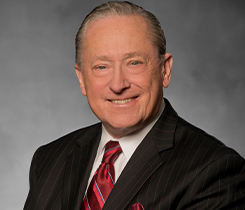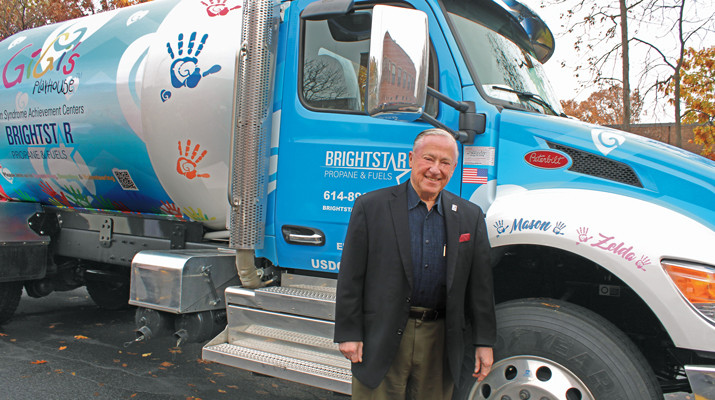LP Gas Hall of Fame profile: Tom Knauff
The 2025 LP Gas Hall of Fame dinner and induction ceremony will take place April 3 at the JW Marriott Charlotte in downtown Charlotte, North Carolina. This year’s inductees are Tom Knauff of EDP, Rita Pecilunas of Otodata, Walter Smith of Smith Pumps and Full-Circle, and Ken Taylor of White Mountain Oil & Propane. Visit the LP Gas Hall of Fame website.
When 14-year-old Tom Knauff spent a summer working on his uncle’s farm during its transition from using butane to propane, he had no idea that someday, he would make his own transition to propane.

Years later, Knauff graduated from the University of Kansas with a Bachelor of Arts in literature with aspirations of being an English teacher. After a few years on the job, however, Knauff decided he needed to make a change.
“I ran out of patience and money with that,” he says.
After working as a criminal investigator for a time, Knauff switched to a sales role at AT&T and later worked for a manufacturer’s representative firm. Eventually, he decided he needed to move on from that, too.
“I was trying to establish ownership and buy-in, and that wasn’t working,” he recalls. “And I got a call from a good friend of mine that worked with me at AT&T. He and I had gone in different directions, and he stumbled across this company called the Ferrell Companies in a suburb of Kansas City.”
Knauff’s friend had interviewed with the Ferrell Companies, though he received a promotion at his job, so he didn’t accept the new position.
“So he called me and said, ‘You might be interested in this.’ And so I went to work in the wholesale department,” Knauff says.
After that, Knauff caught the propane bug and built his career in the industry. And today, he’s the CEO of EDP, which he launched in 2012.
Staying in propane
Since joining Ferrellgas in 1983, Knauff has spent more than 40 years working in the propane industry in various capacities. He held senior leadership positions at Ferrellgas, co-founded Propane Continental and the investment banking services provider Jordan Knauff & Co. and co-sponsored Liberty Propane, all before the EDP venture.
What makes the industry so attractive to Knauff? For starters, the people.
“One of the things that I was told my very first week in the industry that I’ve never forgotten is that I would find that, in dealing with the people that you deal with in this industry, that they’re very genuine,” Knauff says. “That was the word that was used – genuine. And I’ve always found that to be true after 40 years. The propane industry has really good people. And if you make a deal, you can still make a handshake deal, and people will honor it.”
Knauff also appreciates the many different kinds of people in the industry, propane’s geographical makeup and the opportunities in business.
“The other thing that’s intriguing about it is it’s evenly spread over the United States,” he explains. “So, if you think about the fact that the United States is comprised of 3,300 counties … those counties that are soaked up by major metropolitan areas are about 450, so that leaves about 2,850 rural counties. The propane industry is evenly distributed over all of those. It’s intellectually stimulating because it’s in all of those geographies. There’s a lot of companies.
“So there’s a lot of players, there’s just a lot of things to do, a lot of ins and outs. So I found it to be a very rewarding industry to work in, and it’s got everything that you could want in business – M&A, capital funding, customer service, sales, marketing, leasehold real estate assets, routing and scheduling, supply chain. It’s a fascinating industry, and I’ve always enjoyed it, and I enjoy it to this day.”
An ever-changing industry
After being in the industry for 40 years, Knauff has seen a lot of changes.
One of the biggest changes is in the kind of regulatory issues the industry faces today that weren’t under discussion 10 years ago.
Back in the day, Knauff explains, the issues discussed at industry events like the National Propane Gas Association’s (NPGA) Propane Days included an Occupational Safety and Health Administration rule that would have placed overbearing training requirements on crane operators working at propane businesses.
Knauff also references the industry’s efforts to modify the Jones Act to allow for “foreign flag vessels to be able to deliver propane to the United States,” he says.
While that endeavor was unsuccessful, Knauff says, it’s representative of the issues the industry worried about once upon a time.
“I’m nostalgic about those days,” Knauff says. “Those were the kind of problems that, you know, nobody gets angry with you. Nobody’s protesting. It’s just a matter of sharing information. Most legislators and regulators want to be helpful, and you can communicate about the issue and usually meet with success.”
But today, the propane industry faces more existential issues, including attempted bans on propane forklifts and gas stoves, and the widespread push for electrification.
“Those are all minor compared to outlawing stoves and furnaces,” Knauff says. “When you start trying to outlaw our industry, that’s a whole different category of endeavor. And by the time the company started to get big here at EDP, normally I would have probably had one of the guys on acquisitions be more active in NPGA. And I stayed active with it because of those political issues that I was so alarmed by. I thought they were so misconstrued, so wrong and so dangerous for us as an industry.”

To help deal with these issues, Knauff named Jim Rushing as the company’s vice president of sustainability. In the role, Rushing is responsible for communicating with EDP’s customers and keeping them informed of issues that could threaten propane as an energy source, as well as contacting their representatives and driving pro-propane policies.
“It’s really changed the focus. It made me get a lot more active in the industry and political affairs than I would ordinarily have been,” Knauff says. “I would have been active anyway, because it’s enjoyable, but the threatening aspect of it has taken up a significant amount of my time.”
Looking ahead
When Knauff looks to the future, he sees retirement on the horizon.
“I’m looking at retirement, probably within the next year or so,” he says.
Having already “quasi-retired” in California once before, Knauff decided he “wasn’t cut out for retirement” at the time. This time, he doesn’t want to become bored in retirement.
While not entirely sure what this second attempt at retirement will look like, Knauff has some ideas.
“I might have a relationship with the company [EDP] in a board capacity or advisory capacity going forward; I’d welcome that. I just don’t know yet. It just depends,” he explains. “Maybe some consulting with regard to some of these policy issues. Obviously, in retirement, I wouldn’t be doing anything that would put me in a conflict of interest with EDP, but I might very well do some consulting on the regulatory front.”
However, Knauff still plans to include what some might consider to be more traditional activities.
“I have a son that lives in Italy. We go to Italy a lot to visit with him, so we’ll continue to do a lot of travel. I’ve always traveled a lot,” he explains. “And I’ve got some writing that I want to do, and I enjoy playing classical guitar.
“So, I anticipate being quite busy.”
















